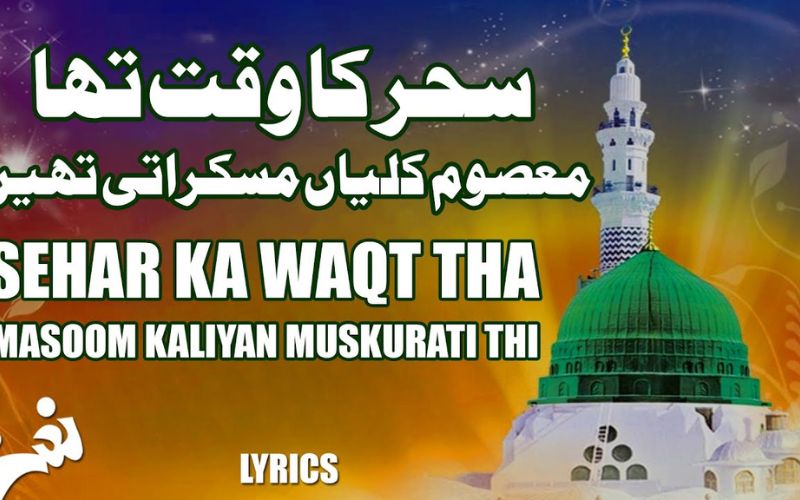“Sahar Ka Waqt Tha Masoom Kaliyan Muskurati Thi” is a timeless Urdu song that has captured the hearts of music enthusiasts across generations. Originating from the golden era of Hindi cinema, this poetic masterpiece weaves a tapestry of imagery, emotion, and cultural resonance that continues to enchant listeners to this day.
The song’s haunting melody, coupled with its profound lyrical depth, has cemented its place as a beloved classic in the annals of Indian music. As we delve into the intricacies of this song, you’ll discover the profound impact it has had on the cultural landscape and its enduring legacy.
Meaning and Interpretation of the Lyrics
The lyrics of “Sahar Ka Waqt Tha Masoom Kaliyan Muskurati Thi” are a masterful blend of poetic imagery and emotional depth. Each line paints a vivid picture, inviting the listener to immerse themselves in the evocative world it creates.
The opening line, “Sahar ka waqt tha, masoom kaliyan muskurati thi,” sets the scene with a serene and tranquil atmosphere. The “time of dawn” evokes a sense of stillness and the “innocent buds” personify the purity and freshness of the morning.
As the lyrics progress, they touch upon themes of love, longing, and the ephemeral nature of life. The use of metaphors and symbolic language adds layers of meaning, allowing the listener to interpret the song on a deeper level.
Here’s a closer look at some of the key lines and their interpretations:
- “Sahar ka waqt tha, masoom kaliyan muskurati thi”
- This line sets the stage, evoking the peaceful and serene atmosphere of the dawn.
- The “innocent buds” personify the purity and freshness of the morning, creating a sense of innocence and wonder.
- “Jiya dhadakne laga, dil mera ghabraane laga”
- This line expresses the sudden stirring of emotions, as the heart starts to beat faster and the mind becomes anxious.
- The use of “jiya” and “dil” personifies the internal experience, adding to the emotional intensity.
- “Kuch aur hi nazara tha, kuch aur hi khayaal tha”
- This line suggests a shift in perspective, where the familiar surroundings take on a new and unexpected meaning.
- The contrast between “nazara” (sight) and “khayaal” (thoughts) highlights the internal and external changes experienced by the narrator.
By delving into the deeper layers of meaning within the lyrics, you can uncover the profound emotional and philosophical resonance that has made this song a timeless classic.
Background and Context of the Song
“Sahar Ka Waqt Tha Masoom Kaliyan Muskurati Thi” was originally featured in the 1957 Bollywood film “Shirin Farhad.” The film, directed by Hrishikesh Mukherjee, was a romantic comedy that explored themes of love, class differences, and societal expectations.
The song was composed by the legendary Sachin Dev Burman, known for his iconic music compositions that have left an indelible mark on Indian cinema. The lyrics were penned by the renowned Urdu poet Majrooh Sultanpuri, whose poetic sensibilities have been instrumental in shaping the rich tapestry of Hindi film music.
The song was performed by the iconic playback singer Lata Mangeshkar, whose soulful and emotive rendition has become synonymous with the track. Mangeshkar’s voice, imbued with a haunting melancholy, perfectly captures the essence of the lyrics and the emotional journey they evoke.
The film and the song were released during a time when Bollywood was experiencing a golden era, with a thriving music industry and a growing audience. “Sahar Ka Waqt Tha Masoom Kaliyan Muskurati Thi” resonated with the public, becoming a beloved classic that has continued to captivate listeners across generations.
Popular Renditions and Covers of the Song
Over the years, “Sahar Ka Waqt Tha Masoom Kaliyan Muskurati Thi” has inspired numerous renditions and covers by various artists, each offering a unique interpretation of the timeless classic.
One notable cover is the soulful version recorded by the renowned ghazal singer Jagjit Singh. His rendition, with its rich baritone and emotive delivery, adds a layer of depth and introspection to the song, resonating with audiences who appreciate the art of ghazal.
Another popular cover is the melodious version by the versatile singer Shreya Ghoshal. Her rendition, with its delicate vocal nuances and sensitive phrasing, showcases the song’s enduring appeal to a newer generation of listeners.
In addition to these acclaimed covers, the song has also been featured in various Bollywood films, television shows, and live performances, further cementing its status as a beloved and iconic piece of Indian musical heritage.
Impact and Reception of the Song
“Sahar Ka Waqt Tha Masoom Kaliyan Muskurati Thi” has had a profound and lasting impact on the Indian music landscape. Its timeless appeal and cultural significance have earned it a revered place in the hearts of music enthusiasts and critics alike.
The song’s enduring popularity is a testament to its ability to transcend time and touch the souls of listeners. It has become a staple in the repertoire of many classical and semi-classical music performances, where its poetic lyricism and soulful melody are celebrated and revered.
Critics have praised the song’s ability to evoke a sense of nostalgia and emotional resonance, with many hailing it as a masterpiece of Urdu poetry and musical composition. The song’s impact extends beyond the realm of music, as it has become a cultural touchstone, representing the rich heritage and artistic traditions of India.
Translating the Lyrics and Understanding the Poetic Elements
To fully appreciate the depth and beauty of “Sahar Ka Waqt Tha Masoom Kaliyan Muskurati Thi,” it is essential to explore the nuances of the Urdu lyrics and the poetic elements that make the song so captivating.
The Urdu language, with its inherent musicality and metaphorical richness, plays a crucial role in the song’s lyrical brilliance. The skillful use of imagery, symbolism, and metaphor adds layers of meaning and emotional resonance to the words.
For example, the line “Sahar ka waqt tha, masoom kaliyan muskurati thi” not only paints a vivid picture of the dawn but also personifies the “innocent buds” as if they were smiling, imbuing the scene with a sense of wonder and purity.
The poetic devices employed, such as alliteration, assonance, and rhyme, contribute to the song’s melodic flow and rhythmic cadence, creating a seamless integration of music and poetry.
By delving into the nuances of the Urdu lyrics and the poetic elements that shape the song, you can gain a deeper appreciation for the artistic mastery that has made “Sahar Ka Waqt Tha Masoom Kaliyan Muskurati Thi” a timeless classic.
Analysis of the Music Composition and Arrangement
The musical composition and arrangement of “Sahar Ka Waqt Tha Masoom Kaliyan Muskurati Thi” are equally captivating and integral to the song’s enduring appeal.
Composed by the legendary Sachin Dev Burman, the song’s melody is a masterful blend of classical Indian music and the melodic sensibilities of Bollywood. The use of traditional Indian instruments, such as the sitar, sarod, and tabla, creates a rich and evocative soundscape that perfectly complements the Urdu lyrics.
The arrangement features a delicate balance between the lead vocal and the supporting instrumental accompaniment. Lata Mangeshkar’s emotive and nuanced delivery is the centerpiece, with the instruments providing a harmonious and textured backdrop that enhances the emotional impact of the song.
The use of subtle variations in tempo, dynamics, and orchestration throughout the song adds depth and complexity to the musical experience. The transitions between the verses and the chorus are seamless, creating a cohesive and immersive listening experience.
The interplay between the melody, harmony, and rhythm in “Sahar Ka Waqt Tha Masoom Kaliyan Muskurati Thi” is a testament to the exceptional musical craftsmanship of Sachin Dev Burman and the talented musicians who brought this timeless classic to life.
The Legacy of the Song and Its Influence on Indian Music
“Sahar Ka Waqt Tha Masoom Kaliyan Muskurati Thi” has left an indelible mark on the Indian music landscape, influencing generations of artists and audiences alike.
The song’s enduring popularity and cultural significance have cemented its status as a true icon of Indian musical heritage. It has been celebrated, studied, and revered by scholars, musicians, and music enthusiasts, who recognize the song’s profound artistic merit and its ability to transcend time and space.
The song’s impact can be seen in the way it has inspired and influenced subsequent generations of musicians and composers. Many contemporary artists have drawn inspiration from the song’s melodic and lyrical brilliance, incorporating its essence into their own creative works.
Moreover, “Sahar Ka Waqt Tha Masoom Kaliyan Muskurati Thi” has played a significant role in shaping the public’s perception and appreciation of Indian music. It has helped to bridge the gap between classical and popular music, introducing a wider audience to the richness and depth of Urdu poetry and the musical traditions of the subcontinent.
The song’s enduring legacy is a testament to the power of music to touch the human soul and to preserve the cultural heritage of a nation. As you explore the depths of this timeless classic, you can’t help but feel a sense of wonder and reverence for the artistic genius that has made “Sahar Ka Waqt Tha Masoom Kaliyan Muskurati Thi” a true masterpiece of Indian music.
Exploring Other Iconic Songs from the Same Era
While “Sahar Ka Waqt Tha Masoom Kaliyan Muskurati Thi” stands out as a true gem of the golden era of Hindi cinema, it is not the only iconic song that has left an indelible mark on the musical landscape.
The 1950s and 1960s were a prolific period for Indian music, with composers and lyricists creating a rich tapestry of timeless classics. Some other notable songs from this era that have achieved a similar level of reverence and cultural significance include:
- “Pyar Kiya To Darna Kya” from the film Mughal-e-Azam (1960): Composed by Naushad and featuring the soulful vocals of Lata Mangeshkar, this song is a testament to the power of love and the courage to defy societal norms.
- “Aye Meri Zohra Jabeen” from the film Waqt (1965): Composed by Ravi and featuring the emotive rendition of Lata Mangeshkar, this song is a poetic ode to a beloved’s beauty and grace.
- “Yeh Mera Dil Yaar Ka Diwana” from the film Don (1978): Composed by Kalyanji-Anandji and sung by Kishore Kumar, this upbeat and catchy song has become a beloved classic in the annals of Hindi film music.
- “Dil Dhadakne Laga” from the film Dil Dhadakne Do (2015): While not from the same era, this contemporary song, composed by Shankar-Ehsaan-Loy and featuring the vocals of Arijit Singh, pays homage to the timeless tradition of Urdu poetry and musical excellence.
By exploring these other iconic songs from the same period, you can gain a deeper appreciation for the rich tapestry of Indian music and the enduring legacy of the golden era of Hindi cinema.
Conclusion
“Sahar Ka Waqt Tha Masoom Kaliyan Muskurati Thi” is a true masterpiece of Indian music, a timeless classic that has captivated audiences for generations. Through its evocative lyrics, haunting melody, and cultural significance, the song has become a beloved part of the nation’s musical heritage.
As you delve into the depths of this iconic song, you can’t help but be struck by the artistic genius that has gone into its creation. From the poetic brilliance of the Urdu lyrics to the masterful composition and arrangement, every element of the song is a testament to the rich tradition of Indian music.
The enduring legacy of “Sahar Ka Waqt Tha Masoom Kaliyan Muskurati Thi” serves as a reminder of the power of music to transcend time and space, to touch the human soul, and to preserve the cultural heritage of a nation. As you continue to explore and appreciate this timeless classic, you’ll find yourself drawn into the captivating world of Indian music, where the past and present coexist in a harmonious symphony.
To delve deeper into the world of Indian music and discover more timeless classics like “Sahar Ka Waqt Tha Masoom Kaliyan Muskurati Thi,” be sure to subscribe to our newsletter. You’ll receive exclusive updates on the latest articles, playlists, and events that celebrate the rich musical heritage of the subcontinent. Don’t miss out on this opportunity to expand your musical horizons and connect with a community of passionate music enthusiasts.



